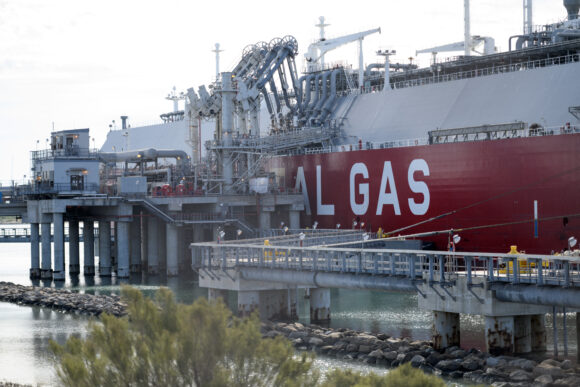Cheniere Energy Inc.’s top executive Jack Fusco wants the biggest gas exporter in the US to set the rules to measure the environmental impact of liquefied natural gas, using a fleet of methane tracking technologies and the company’s clout as the nation’s top consumer of the fuel.
Cheniere amasses data using satellite imagery, helicopters, drones, fixed sensors and emissions tracking from lidar, or light detection and ranging, Fusco said in an interview last week at the Gastech summit in Houston. In 2022, the company began listing emissions data associated with each contractual loading from two export plants in Louisiana and Texas.
“Society wants a cleaner fuel source. And our challenge is to make sure not only that we keep up but that we lead,” Fusco said.
Tracking emissions for the super-chilled fuel from the US is key to meeting demand from buyers in Europe as lawmakers in the European Union are working on regulations to curb methane — the main component of natural gas — via imported energy supplies. Cheniere already adheres to a United Nations-led program to measure methane, which the European Commission has cited in its proposed regulations. Proponents of establishing methods for tracking LNG emissions say that eventually determining how to standardize a system will have ripple effects on global LNG buyers and sellers.
But environmental organizations and researchers have pushed back on the methods used to track methane. Cornell University professor Robert Howarth authored a study released in late 2023 that rekindled the fight over just how much LNG contributes to global emissions, saying natural gas “isn’t any better for the climate than coal.” The Biden administration continues to study environmental impacts of LNG and paused permitting for new projects in January.
As the US is due to double its LNG export capacity through the end of the decade, Cheniere says it expects to be ahead of other LNG exporters who aren’t tracking emissions and aims to use its leverage as the nation’s top gas consumer to set global standards.
Fusco unexpectedly compared Cheniere’s position with methane tracking with Whole Foods, referring to the grocer becoming the first certified organic food national retailer and thus setting industry standards.
“They put the rules of the road and then they used the purchasing power to make sure people complied with it,” Fusco said of the grocer. “We’re getting there. But as you know, we buy a lot of gas.”
Topics USA
Was this article valuable?
Here are more articles you may enjoy.



 A 10-Year Wait for Autonomous Vehicles to Impact Insurers, Says Fitch
A 10-Year Wait for Autonomous Vehicles to Impact Insurers, Says Fitch  How One Fla. Insurance Agent Allegedly Used Another’s License to Swipe Commissions
How One Fla. Insurance Agent Allegedly Used Another’s License to Swipe Commissions  Fingerprints, Background Checks for Florida Insurance Execs, Directors, Stockholders?
Fingerprints, Background Checks for Florida Insurance Execs, Directors, Stockholders?  Experian Launches Insurance Marketplace App on ChatGPT
Experian Launches Insurance Marketplace App on ChatGPT 

